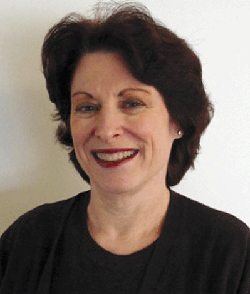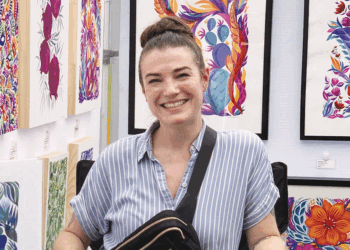Rabbi Miriam Jerris, of the Society for Humanistic Judaism, will offer two talks Feb. 19 and 21
By ERIN ELLIOTT BRYAN /Â Community News Editor
Humanists are not atheists.
According to Rabbi Miriam Jerris, rabbi of the Society for Humanistic Judaism (SHJ), Humanists focus on what they believe rather than on things for which they have no evidence.
“Humanistic Jews don’t have any information about the existence or the nonexistence of God; we have no proof about either of those premises, so we take a position that is called ignosticism,” Jerris told the AJW in a recent phone interview. “We can’t rely on the faiths to make this a better world; we’re responsible. We can’t rely on something outside of our community or ourselves to be compassionate, loving, caring and meeting the needs of people in the here and now; we have to do that.”
Jerris will be in the Twin Cities Feb. 19-21 and she will speak at events sponsored by Or Emet, the Minnesota Congregation for Humanistic Judaism. In addition to meeting with the congregation’s leadership, Jerris will lead the Humanistic Shabbat service, which Jerris created, on Friday, Feb. 19 and present “Too Jewish — Not Jewish Enough: The Challenge of Tradition for Humanistic Jews.” She will also present “Humanistic Judaism: Raising Believers, Ages 3 to 103. What Humanistic Jews Believe” on Sunday, Feb. 21.
All events are free and open to the public.
Jerris grew up in Windsor, Ontario, Canada, where there was only an Orthodox synagogue until she was 11 years old. At that time, Jerris’ family was one of a small group that established a new Reform synagogue — the first rabbi of which was Sherwin Wine, who would go on to found the Society for Humanistic Judaism in 1969.
The Jerris family eventually relocated to Detroit, where they joined Wine’s newly established Humanistic congregation.
“I actually traveled with Rabbi Wine through the whole process of founding organizations,” Jerris said.
The pair first founded the Humanist Institute, which certified Humanist leaders and ceremonialists, and started the movement’s rabbinic seminary in 1992 — Jerris graduated in the second class.
 Rabbi Miriam Jerris: We have the ability to look at the world and determine what’s right and what’s wrong. We don’t need a higher authority letting us know. (Photo: Courtesy of Or Emet)
Rabbi Miriam Jerris: We have the ability to look at the world and determine what’s right and what’s wrong. We don’t need a higher authority letting us know. (Photo: Courtesy of Or Emet)
Although Or Emet does not have a rabbi, the congregation is led by a madrich, Harold Londer, a recognized leader with all the rights and responsibilities of clergy. As SHJ rabbi, Jerris works with the movement’s communities, particularly those that don’t have rabbinic leaders, to help them grow and develop.
“Just as you think about a rabbi for a congregation, I’m the rabbi for the movement,” Jerris said. “I’m that community development resource person. I travel a fair amount and do programming, just like I’m doing for Or Emet, to help give them a boost, talk through some of the issues that they’re having and raise the awareness of the congregation.”
According to Jerris, Humanistic Jews have rewritten most blessings and incorporate prose, poetry (both ancient and modern) and “beautiful things” from the Torah in their services and lifecycle events. Humanism focuses on the moral lessons of Jewish stories and holidays that celebrate Jewish culture.
“We do the traditions and we say things that we believe,” Jerris said. “We have the ability to look at the world and determine what’s right and what’s wrong. We don’t need a higher authority letting us know.”
Margo Fox is in her fourth year as president of Or Emet. She said that Jerris’ visit is an opportunity for those in the community to learn about the movement on a local and national level.
“It’s a chance for people in the community to come and learn, and get a sense of the fact that Humanistic Judaism is more than Or Emet,” Fox said. “It is a movement that is growing across the country and across the world.”
Both Jerris and Fox stressed that Humanistic Judaism is a welcoming community that celebrates diversity. Anyone can become a member of a Humanistic congregation and no formal conversion is required.
According to Fox, Or Emet was established more than 20 years ago and currently has about 50 families that are paid members. Special events like the Passover seder and High Holiday services, which do not require tickets, can attract 150 people or more.
Fox said that many of Or Emet’s members are intermarried families and come from a variety of belief systems.
“This is a place where everybody has the same ethical base and appreciates Judaism,” she said. “We do the things we do not for any reward or any thought of an afterlife, just because it’s the right thing to do.”
Or Emet sponsors Shabbat services and programs twice per month, usually at the Sabes JCC and Friends School of Minnesota. The congregation also runs a monthly Jewish Cultural School for children (divided by grade into the Littles, Middles and Juniors), where Fox said students are given the opportunity to work out for themselves what they believe — education programs for parents and other adults are offered at the same time.
Fox first found Or Emet through an ad that touted the congregation as “A Home for Wondering Jews.” She said the congregation has been welcomed by both JCCs and feels that the local community is open to Or Emet as another arm of Judaism.
“Judaism is a people, not a religion — the religion came afterwards,” Fox said. “So, we celebrate that and are enjoying doing it.”
***
Rabbi Miriam Jerris will lead the Humanistic Shabbat service and present “Too Jewish — Not Jewish Enough: The Challenge of Tradition for Humanistic Jews” 7:30 p.m. Friday, Feb. 19 at the Sabes JCC, 4330 Cedar Lake Rd. S., St. Louis Park. She will present “Humanistic Judaism: Raising Believers, Ages 3 to 103. What Humanistic Jews Believe” 10 a.m. Sunday, Feb. 21 at the Friends School of Minnesota, 1365 Englewood Ave., St. Paul (use north entrance).
For information about Or Emet, contact Fox at 651-699-6302 or visit: www.oremet.org. For information about the Society for Humanistic Judaism, visit: www.shj.org.
(American Jewish World, 2.5.10)










 Rabbi Miriam Jerris: We have the ability to look at the world and determine what’s right and what’s wrong. We don’t need a higher authority letting us know. (Photo: Courtesy of Or Emet)
Rabbi Miriam Jerris: We have the ability to look at the world and determine what’s right and what’s wrong. We don’t need a higher authority letting us know. (Photo: Courtesy of Or Emet)








